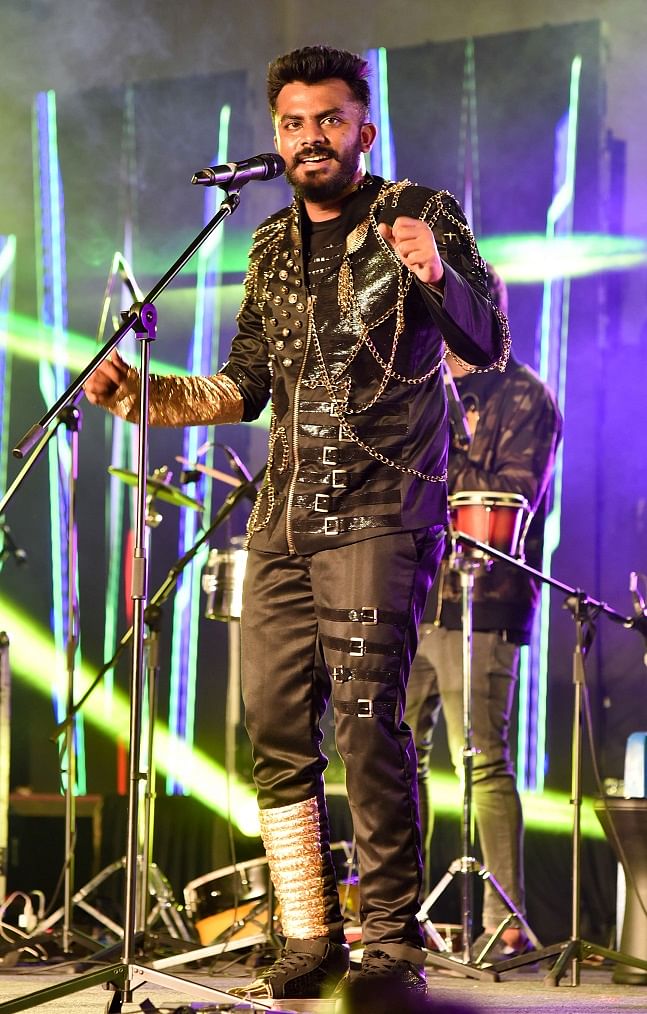
Kannada rapper Chandan Shetty was summoned and questioned by the police for a song he sang.
It is about ganja, and was recorded three years ago for a film that was eventually shelved. The song can be heard on YouTube.
So is a singer responsible for the words in his song? Is he accountable for what the lyrics say, or is he like an actor who mouths a character’s words?
This is what industry insiders told Metrolife:
‘Let him be’
Midhun Mukundan, Music composer
“As composer, I am not in charge of the lyrics. I can make suggestions. When it comes to a singer, this freedom is even less. A singer is given a song and told how to sing it. He does his bit and leaves. Films explore many topics. Even if Chandan wrote the lyrics, he has the freedom to explore anything as an artist.”
‘Singers should get lyrics modified’
Badari Prasad, singer
“Singers are responsible for the songs they sing. They shouldn’t take up songs with indecent or obscene lyrics. If I am asked to work on a song that doesn’t seem right, I will contact the lyricist and request him to work around it. If he doesn’t agree, I will refuse to be a part of the song.”
‘An act of moral policing’
Kavitha Lankesh, Film director
“Chandan shouldn’t be held responsible for the content of the song. This just looks like an act of moral policing. It’s probably because Chandan is popular that he was targeted; no one knows the lyricist. When I wrote Deveeri, which was set in a slum, I included some swear words. Yet I got a U certificate for it. Now, if you try to make a film with just one such word, the censor board either asks you to snip it off or slams an A certificate on the film. People are oversensitive.”
Rap always tries to break lyrics taboos
Many rap singers in Bengaluru are exploring themes earlier considered unsuitable for songs.
Some use profanity. In the case of the ganja song now in the eye of a storm, rapper Chandan Shetty sings, ‘If a Baba takes a puff, it’s prasada/If we take a puff, it’s nishedha.’
Nishedha refers to the ban on marijuana.
Rap, with its roots in African “rhyme, rhythmic speech and street vernacular,” is not averse to taboo subjects, and is often seen as representing protest.
Metrolife brings you Bengaluru rap artists and their thoughts:
Karthik Sundar Gubbi
Rap, Gubbi says, is closer to prose than poetry. He prefers to keep his songs clean and free of profanity.
“Poetry involves metaphors and fancy words but rap is more direct and to the point. We write our hearts out,” he says.
Hit song: Naadamaya, Outta This World.
MC Bijju
Popular Kannada rapper Bijju says profanity often reflects the frustration of two generations failing to communicate. People should be more welcoming of artistic experiments, and not jump to judge a work, he says.
Hit song: Ivattilla Naale.
Vineeth Vincent
Beatboxer Vineeth Vincent has jammed and performed with rappers from across India and the world. “I’m not a big fan of profanity in rap or any genre of music,” he says.
“Both beautiful and disturbing things come out of artistic freedom.”
Rahul Dit-O
Here, rap songs are mostly seen as party songs, and that is not the case, says Rahul.
“Youngsters think it’s cool to use profanity in their songs. It is not necessary. Singing Kannada words with a foreign accent is not rap either,” he declares. Artists must know where to draw the line, and famous people must be careful as they influence their fans, he says.
Hit songs: Thago, Nangansiddu.
Big Deal
Samir Rishu Mohanty with his artist name of Big Deal describes rap as a street art. “Rap being a spoken art makes a greater impact than any other genre,” he says.
“The use of profane words is needed sometimes to make a deeper impact.” Samir says rap can explore topics not usually taken up. “That’s what makes it special,” he says.
Hit songs: Shine, Break free, Take me to the top.
Brodha V
Vighnesh Shivanand, popularly known as Brodha V, says African-Americans initially used rap to speak about their miseries, angst and frustration.
“Rap obviously has a wild nature to it,” he says. When politicians are free to give hate speeches and get away, why are artists being hauled up for their work, he wonders.
Hit songs: Aathma Raama, Shook Ones.